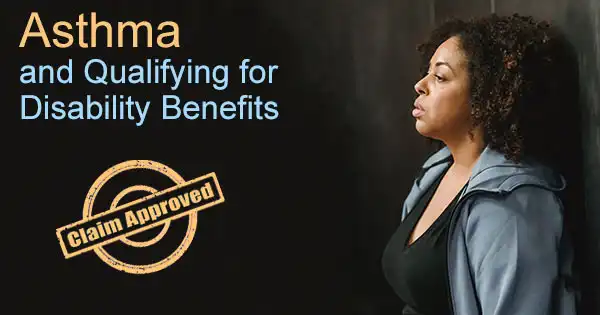Asthma and Qualifying for Disability Benefits
Can I get disability benefits if I am suffering from the effects of asthma?
Author Attorney Lloyd Bemis:
Updated: 9/27/2024
Summary: Can I get disability benefits if I am suffering from the effects of Asthma ?
First you must meet the SSA’s financial requirement: You must have worked long enough, recently enough, and not made over a predetermined level of income.
Second you must meet the medical requirements:
To qualify for disability benefits an individual with asthma must demonstrate a low FEV1 value, which is determined through a pulmonary function test, additionally they must have experienced three separate hospitalizations due to asthma complications, each lasting at least 48 hours and spaced at least 30 days apart.
For those with chronic asthmatic bronchitis, qualification for Social Security Disability Insurance (SSDI) may be possible based solely on lung function test results, provided the FEV1 level aligns with the criteria for COPD, which is less stringent than that for asthma. It is essential to document severe asthma attacks that necessitate intensive treatments, such as intravenous bronchodilators or prolonged inhalational therapy, along with a confirmed diagnosis and physical examination results.
Comprehensive medical records and documentation of adherence to at-home treatments are crucial.
Approximately 25 million Americans have asthma, a chronic inflammatory disease of the lungs. Asthma can be a minor nuisance or a major problem; it can interfere with a person’s daily activities or lead to a life-threatening situation. Though asthma cannot be cured, its symptoms can be managed over time.
If you are suffering from the effects of Asthma you may qualify for disability benefits if certain conditions are met.

The SSA recognizes Asthma in its Blue Book under Section 3.03. To qualify for Social Security Disability benefits the requirements of the listing must be met or the inability to work must be proven. Call 512-454-4000 for help today!
When asthma occurs, airways in the lungs become inflamed and swollen and sometimes produce extra mucus.
The muscles around airways tighten, making it hard for air to pass through. As the airways narrow, a person will have difficulty breathing and may wheeze and cough uncontrollably.
In addition to coughing and wheezing, a person may experience the following symptoms:
- Pain, tightness and/or pressure in the chest
- Difficulty breathing
- Difficulty sleeping because of breathing problems
- Tightening of the neck and chest muscles
- Rapid breathing
- Difficulty speaking
- Anxiety or panic
- Pale or sweaty face
- Bluish lips or fingernails
These or a combination of these symptoms can cause you to miss work and jeopardize your ability to maintain employment.
Treatment emphasizes long-term management of symptoms to prevent asthma attacks.
Patients are advised to avoid triggers, take medications, and track their breathing. Medications are prescribed according to age, symptoms, and triggers. Long-term medications can reduce inflammation in airways while inhalers can quickly open swollen airways that inhibit breathing. Allergy medications and injections may help if asthma is triggered by allergens. Demonstrating that you are following your doctor’s treatment plan is an important part of qualifying for disability benefits.
Asthma can eventually cause permanent narrowing of bronchial tubs and affect how a person breathes.
A person may also experience side effects from long-term use of medications. As a result, asthma can interfere with a person’s work life, sleep, and other daily activities. Though asthma is a common reason why people apply for Social Security Disability Income, many are often denied because asthma can usually be treated effectively with medication. Only the most severe cases of asthma will qualify for disability benefits.
Qualifying for Disability for Asthma
The Social Security Administration lists asthma as a disability under Section 3.03. In order to meet the requirements of this listing, you must have:
- An FEV1 value that is low for your age, gender and height (according to Social Security’s chart). This is a measurement taken from a pulmonary function test that calculates the amount of air a person can force out of their lungs in 1 second.
- Three instances of complications or exacerbations which require hospitalization of at least 48 hours each. The hospitalizations must be 30 days apart.
AND
If you have chronic asthmatic bronchitis (when asthma and chronic bronchitis occur together), you may be able to qualify for SSDI on the basis of a lung function test alone.
Under those circumstances, your FEV1 level must be the same level as that required for COPD. That level is a lower level than that required for asthma.
This means you must be able to prove that your asthma attacks are severe enough to require intensive treatment such as intravenous bronchodilators, intravenous antibiotic administration, or prolonged inhalational bronchodilator therapy in a hospital, emergency room or equivalent.
In addition to a confirmed diagnosis and results of a physical exam, you must document each asthma attack that required emergency treatment or hospitalization over one year.
Your medical records should include results from the following tests:
- Spirometry test – measures how much air a person can breathe in and out of the lungs and how quickly they can exhale. A spirometry test should also be done when not having an attack to create a baseline measurement.
- Arterial blood gas studies – measures oxygen and carbon dioxide levels in the blood.
- FVC test results – the amount of air a person can forcefully and quickly exhale after taking a deep breath.
- FEV1 results – the amount of air a person can force out of the lungs in one second.
Your medical records must also show you are following at-home treatments like using an inhaler.
If you cannot meet the requirements of the listing, Social Security will consider how asthma limits your ability to perform your previous job.
Social Security will conduct a Residual Functional Capacity assessment to evaluate what tasks you are able to perform despite having asthma. Restrictions might mean exclusion of jobs that require heavy exertion, working around dust and fumes, or extreme cold or heat.
Additionally, you may still be eligible for Social Security Disability benefits if you have another impairment; for example, high blood pressure or diabetes, that prevents you from working full time.
By itself one disorder may not meet the requirements of an impairment as stated in Social Security’s Blue Book, but if you have multiple medical conditions, Social Security must consider how those health issues, combined together, limit your ability to hold a job and perform necessary daily tasks.
If you have asthma and it has impacted your ability to hold a full-time job, you may be eligible for Social Security Disability benefits.
Because of Social Security’s strict requirements, filing for disability benefits under an asthma diagnosis may be too complex to go it alone. An experienced Social Security Disability attorney can help evaluate your case and guide you through the process, increasing your chances for a successful claim.
In order to qualify for Social Security Disability, you will need to satisfy a few specific requirements in two categories as determined by the Social Security Administration.
The first category is the Work Requirements which has two tests.
- The Duration of Work test. Whether you have worked long enough to be covered under SSDI.
- The Current Work Test. Whether you worked recently enough for the work to actually count toward coverage.
The second category is the Medical Eligibility Requirement.
- Are you working? Your disability must be “total”.
- Is your medical condition severe? Your disability must be “severe” enough to interfere with your ability to perform basic work-related activities, such as walking, sitting, and remembering.
- Is your medical condition on the List of Impairments? The SSA has a “List of Impairments” that automatically qualify as “severe” disabilities. If your disease is not listed this does not mean you cannot get disability, it means you must prove you cannot maintain employment due to your limitations.
- Can you do the work you did before? SSDI rules look at whether your medical condition prevents you from doing the work you did prior to developing the condition.
- Can you do any other type of work? If you cannot do your prior work, an evaluation is made as to whether you can perform any other kind of work.
More details can be found on our Qualifying for Disability page.
Disability benefits are an important source of income for those who are unable to work. If you are not able to work due to accident or illness, you may be eligible for Social Security Disability or Long Term Disability benefits. If you have applied for benefits and been denied, contact the attorneys at Bemis, Roach and Reed for a free consultation. Call 512-454-4000 and get help NOW.
Try these links for further reading on this subject:
Obtaining disability for Chronic Obstructive Pulmonary Disease – COPD
Can I get Disability for Lung Cancer?
Bronchiectasis and Qualifying for SS Disability Insurance


![]()
Your Free Initial Consultation
Call now:
At Bemis, Roach and Reed, if we can't help you, we will try to find the right attorneys for you.
We offer each of our prospective clients a free no obligation one hour phone or office consultation to see if we can help you and if you are comfortable with us. We know how difficult a time like this can be and how hard the decisions are. If we can be of assistance to you and help you find a solution to your issue we will, even if that means referring you to another attorney.
Let's get you Started:
If you could provide us with some basic information about your claim we will get right back with you with a free case evaluation and schedule your Free Consultation Today.
You can also email us at: contact@brrlaw.com
Kind Words from Our Clients
“The attorneys and staff at Bemis, Roach & Reed have provided me and my husband, Jeff, with stellar advice, care, and service. They made navigating the SSDI process easy, painless, and as timely as possible. During this difficult time in our lives it was a tremendous relief to know they were on our side and keeping us updated on next steps and timelines. We also had questions about my husband’s long term disability insurance and they helped us get those questions answered and resolved without any additional fee. I highly recommend Bemis, Roach & Reed.” – Kelli G
“I needed a lawyer for my case and had googled best lawyers. They came up first on my list and decided to give them a call. From the moment I called I knew I chose the right people. They said they would fight for me and fight they did. They knew what they were doing and kept good communication throughout the process. If you need someone that will listen, understand, and fight then these are the people. HIGHLY RECOMMEND.” – Marcel L.
“I’ve had a great experience working with Bemis, Roach & Reed for my disability case. I spent two years fighting on my own, until I was informed to look for a disability lawyer. Right away, sending in questions was a breeze, and from the moment my case was accepted, everything became a major weight off my shoulders. My newest appeal was filed for me, my medical records and case history sorted for me, and I could finally focus on my appointments and treatment with a little less worry. Everything was explained to me in a way that made sense, the process was set out in an easy to understand way. And, just like that, at the beginning of July 2023, my claim was accepted!” – Sunshinemutt






